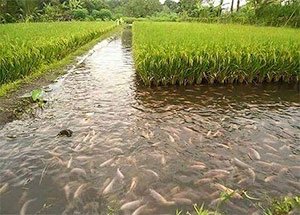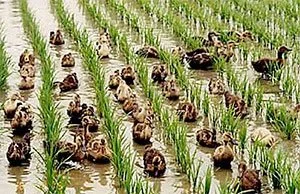The Economics of Organics
If it ain’t good for the planet, how can it be good for the people ?
We've been fed a hard line on pesticide use, along with the products they're sprayed on.
There has been little discussion about conventional farming at the governmental level, and almost no debate on the data that flies about in the numerous countercultures... But it is starting to mount up (as actual data does), and the cracks in the conventional argument have got a few feisty weeds growing in them.
Even the Telegraph reported recently on a new study, and was bold enough to say "pesticides on foods are far more dangerous than was thought", and "residues from insecticides are damaging the brain, and reducing the IQ of the population."...
You can read the full thing here if you feel to, but if you're looking for evidence of falling IQ, just look at the methods we have devised to grow our food !
This is nothing new for an old permaculturist like myself, but might be shocking to the average Telegraph reader who happened to glance those words whilst wrapping up their chips.
But, I am glad to see that the subject is at last hitting the mainstream.
So much so that the report that they are citing is calling for a complete reassessment on public exposure to such things - but in reality, it is not newspapers that shape the world, it is money - and that relies upon people buying the products, rather than buying into the story.
I am, as usual, more interested in the context than the nitty-gritty, and that is best done by looking at the history.
But the next blog post will look more at the biology too, if you’re a “nuts & bolts” kind of person.
Just Carry on
All this chemical manipulation is relatively new : Since WWII in fact.
It is important to grasp that before this time, we didn't have the speedy, refrigerated networks to transport fresh, live veg very far or fast. Thus to assist the war effort, households were lawfully encouraged to grow a kitchen garden to supply the family with the perishable vegetable matter that the state couldn't - in other words, to help the population survive the impact of a diet suddenly dominant in what they could transport - bread & eggs.
In the face of war, most health issues are understandably downgraded. Just 'carry on' was the only way to deal with anything under such harsh conditions.
Once victory was attained, the damage started to show. A society devoid of the male population, an economy in rebuild, and a booming wartime farming industry, producing dense foods that can easily be stored and distributed - a wonderful economic model. What to do, but just 'carry on', so this style of mass, mono-crop agriculture was further encouraged - and is still taught today in agricultural schools the world over, despite everyone ‘on the ground’ saying otherwise.
However, the weapons industry, a booming war-time trade, suddenly had much less to do, and was far too economically valuable to just be shelved, so it was re-tasked, re-skilled and re-tooled to a war on plants…
“We stopped killing each other, and turned our weapons on nature”
Agent Orange, the notorious Vietnam war mass-defoliant, is now a popular herbicide (both industrially and domestically), despite being a hormone-modulator with known links to Non-Hodgkins Lymphoma and endlessly verified birth defects.
But because 2,4-D was released on the market before rules were set up about such things, it slipped through the regulatory net, despite several tries to get it assessed to modern standards.
Over 100 different pesticides are known to cause neurological effects in adults, let alone on the growing brains of children, and none of this even looks at wildlife.
According to the federation of Public Interest Research Group in the US, 29 popular fertilisers tested positive for 22 toxic heavy metals, including silver, nickel, selenium, thallium and vanadium; all linked directly to human health hazards.
So, where is this case for continuing to subject the population to this ongoing experiment - to which endless research has already shown us the results.
I wonder if it could be an economic interest... I wonder...
Economics over Ecologics
Any amateur economist can tell you why the food chain has to supply money as well as food. The trouble comes when it outweighs the need for nutrition itself.
And once you get this, agricultural conspiracy theories start to sound more like solid business propositions. And it simply follows that policy-making will hold agribusiness at its heart, protecting the produce, and almost making consumers into the commodity.
The insanity is not in the chemistry, or the economics, it is in the system that necessitates one over the other. But it is a very short term gain - in the bigger picture.
The (notso) Green Revolution
The post-war promise of ‘bountiful food for all’ seems to work at a surface glance, but the supposed nutritional merits of such a system should not be assumed.
We certainly have co-opted the land to do exactly what we need it to do economically, but the land used to supply us with much more than just food, such as nutrition, wilderness, wildlife, water management, clean atmosphere, etc.
Wonderfully confusing indicators are appearing, like nutritional deficiencies in the obese. Excessive consumption of foods, coupled with malnutrition. They are a magically clear indicators of the paradox we have set in motion - to produce more substance without sustenance. Quantity without quality.
And even if we discount the terrible chemistry of this agricultural era, we find the same downward trend in the nutrition itself that food no longer supplies.
But nowhere is it more apparent than in the developing world, where contrast can be drawn with stark clarity because of their very recent uptake of changes to conventional farming.
Short Gain Rice
A Chinese paddy farmer has been growing his way for generations, eating not only the rice he produces, but also the fish, frogs and ducks that live in the paddy water, plus the fruit of trees and herb bushes peppered amongst the rice paddies.
A pretty round diet, full of diversity, and seasonality, defined over thousands of years of trial and error through the saving of heirloom seed that careful selection has honed to thrive in the local environment, and utilising what is locally available.
And when Dr. Pharma shows up with his suitcase full of enticing statistics, promoting faster-growing, higher-yielding rice, there is initial resistance. Clever advertising, economic pressure, and political manipulation do not convince the old-time farmer of generations, but it wins the minds and greedy hearts of his children, so in the long run, the switch gets made.
He has to buy a few fertilisers to stimulate (economic) growth, but the additional income from the extra yield will easily cover this, and then he can buy his family a TV.
What is not in that suitcase of statistics is that all the fish and frogs will be poisoned by the fertiliser, and the trees won't fruit properly anymore, so the birds don't nest there, and soon his diet has gone from balanced and well-rounded to a large bowl of just white rice. Moreover, while the harvest is more profitable, it doesn't replant well, so every year you have to buy the seed again. Moreover, without the biodiversity to keep things in check, the crops become susceptible to more pests and diseases, so additional chemistry is now needed - the bill goes up, but still the extra yield covers it - just. But with each successive harvest, the crop requires more chemistry, so more and more profit filters from the farmer to the chemists, and now the producer of food is stuck in a profitless loop. Government subsidies are brought in to save the failing farming industry, and now the funds are being sucked from taxes into the pockets of the international companies that supply the agrochemicals.
Moreover, as the crops increase, the machinery follows suit, and less and less people are needed to run the farm, so the economic abundance of the local social structure fails, and more and more is syphoned off into distant economies.
And while this model is more obvious in developing nations, whose governments are locked into repaying IMF loans, thus under pressure to perform, it is equally constrictive here.
The atmosphere in this country is that there is no money in farming anymore - even with the government subsidies paying for the massive machines and exorbitant chemical bill. Every farmer I know is supplementing their income by converting barns into Air B&B stays, and moving gradually away from working the land.
The Wicked Wind
And that is just the pesticide racket. The deck is loaded even more in Dr. Pharma's favour with GMOs. With this genius technology, it actually doesn't matter if Mr. Farmer buys into the spin, because someone else in the valley will, and within a couple of years, all the seed he saves will have detectable amounts of Mr. Pharma's trademarked genes, through the natural cross-pollination of crops. So the seed stock is legally owned by the patent holder of that GMO, for which he can retrospectively charge. And sue if unacknowledged ! Endless cases are being won by Monsanto (an easy target I know, but they do set themselves up for it) against farmers for Patent infringement because of this…
Most GMOs work by imbuing the plant with a new gene that resists the corrosive action of Glyphosate. This clever chemical (another direct descendant of wartime defoliants) starves plants by messing with their capacity to uptake certain essential nutrients - unless of course they has this virally-inserted gene. Thus plants without this capacity die off - ie; weeds.
A great plan for perfecting the flawed icon of agricultural productivity - monocultures.
Thus it is 3 times more popular than any other herbicide in the US, and annual sales have gone from $5 billion in 2015 to a staggering $9 billion in 2021
But Glyphosate doesn’t biodegrade, so it leaves one life form and travels to the next, thus everything downstream from the runoff will also be affected - broadleaf forests, grasses, pond weed, river plants, sea weed, etc.
And when we look at the affects upon the animal kingdom, we find endless, massive examples of chromosome disruption, and general death and disease.
This is similar pattern we have seen before with DDT - now banned in most developed nations for this reason, but still used across the world by smaller, less-discerning nations. It is so persistent that it was been found in ALL breastmilk tests, and the eggs of Siberian eagles - despite never been applied in Siberia itself !!!
“Incidentally, pesticide-related illnesses among farm workers in U.S.A. each year is around 300,000. Number of people in the U.S. who die each year from cancer related to pesticides: 10,400. And as a reference - the number of people in the U.S. killed each year by assault rifles: 250.”
Most developing nations have fallen for the malnourishing and indebting suitcase of delights. You see them in their starving millions in the 'isn’t it terrible' section of the news. Populations swollen and starving, sitting in deserts that were covered in grasses, crops and forests since time-immemorial. What happened ?
But I don't tell horror stories for the sake of keeping you up at night.
The Tide is Changing
The World Health Organisation is now ranking pesticide use as one of the greatest troubling issues of our day, and citing small-scale organic farming as the only sustainable way forward, both for the land, the wildlife and the people.
Even in the mighty US, home of chemical agriculture, organics represented less than 1% of sales in 1997, but in 2015 it was already almost 5%.
Denmark currently has the highest organic produce in Europe - at around 8% - and is moving towards making itself the first completely organic nation.
But is way behind Bhutan, who has governmentally committed to achieving it as soon as humanly possible.
They are already famed for the Gross National Happiness Index, as opposed to the dried and wrinkled Gross National Product that the rest of the world uses to estimate value.
But achieving this at a global level is where it will really count, and you can imagine the resistance this idea is receiving from the most powerful industries in the world (medicine, chemistry & agriculture).
Nonetheless, global organic sales are on the up in a big way - increasing almost fivefold between 1999 and 2013 to $72bn. And better still, this 2013 figure is projected to double every 5 years.
Feeding the World
This year, researchers modelled 500 food production scenarios to see if they could feed the whole population on organic food. They concluded that the key factors are not only the methods of farming, but equally our meat consumption. This is because in current meat farming methods it is estimated that each 1kg of beef requires around 7kg of grain and 17000 litres of water (!!!!!). Each cows requires around 2 acres of decent grazing, and that doesn't even look at the horrendous chemical management. 2 Acres, of course, could feed a lot more than a cow !
But all these things can be done differently, if they aren't solely focused on maximising profit.
A more deliberate weave of grasses make the soil far more stable, meaning that the cows can be out all year, instead of in a shed for the winter to save them trashing the ground.
If farmed less intensively they can be herded amongst feed-hungry crops, and their manure becomes a resource, rather than a problem.
This, in turn, lowers the need for transport and preparation of chemical fertilisers.
Or why does a nation's need for flesh require cow farming?
In most lands goats would be preferable, and their needs are completely different.
Goats and pigs can be used to process wasted food, kitchen scraps and garden cuttings into fantastic manure, milk and meat - as has been done very sustainably for eons. If we scaled things like this into national habits, who knows what problems would be solved, and excesses avoided.
But I am getting ahead of myself with here the Permaculture solutions.
That's what the next article is all about.
For now, let's say that organics are a good step in the right direction, as they lower the density of crops and herds, and bring animal and wildlife concerns back into the mix.
We know that they have the capacity to feed the population up to 10 billion people, so the only thing that is stopping it happening is the massive inertia of the current system, backed up by vested interests and uninformed consumer patterns.
But now you know.
So what you gonna do about it ?
Which way are you going to vote with your hard-earned cash ?
We can't buy what they don't sell,
but they can't sell what we don't buy
So the best thing can do is support this growing trend : Buy products organic wherever you can.
If your quandary is the limited range of such things in a supermarket, then get out of the supermarket. See what your local market has to offer (even non-organic, that is better than the supermarket), or join an organic box scheme - no longer plagued with the old problems of supply problems and lack of variety - there are now numerous options in any location.
Whether your motive is the extra nutrition (looked at in greater depth in the next release), or the benefits for both the farmed and wild animals, the ethics of the chemical and agricultural power balance in the world, your first, best choice is to vote with the only power you have - what you buy.
The pen became mightier than the sword
When politics overtook brute force in the world, there was a time when petitions and lobbying were a powerful force in politics, still used today by the bigger organisations that can afford to devote entire departments to keeping watch on coming laws and trends, and to influence them with massive budgets for lobbying policy-makers… But we have consumer power...
The penny is now mightier than the pen
Which puts the power firmly in the hands of those who deserve it.









